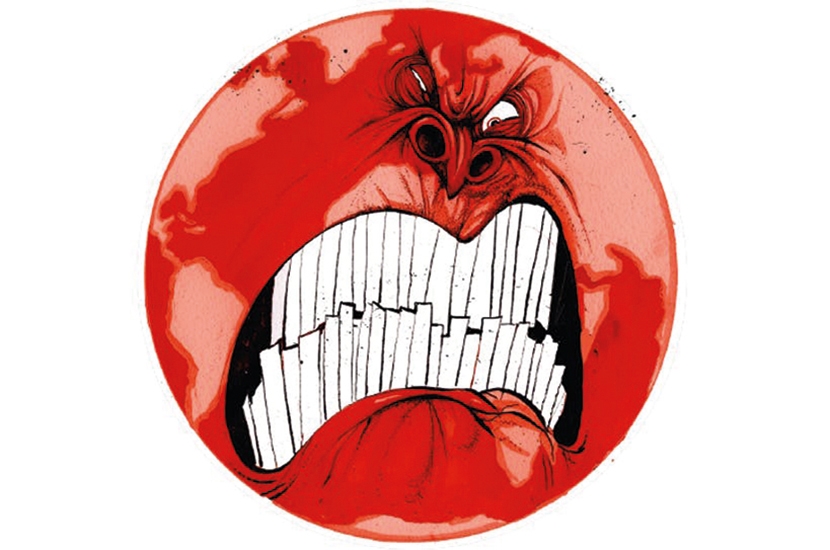Anyone visiting the small Westphalian city of Münster in north-west Germany may notice three man-sized cages hanging from the handsome St Lambert’s Roman Catholic Church in the city’s main square, the Prinzipalmarkt, and wonder about their provenance. The cages are one of the last visible relics of an episode in which society took leave of its collective senses and went quite mad. It is my impression that the western world is currently undergoing just such a convulsion.
Where the 16th century had their crazed prophets crying down destruction on a doomed civilisation, we have our furious activists vying for their 15 minutes of fame
In Münster’s case, what the Germans call massenwahn (mass madness) took place in 1534 after Martin Luther had triggered the Protestant Reformation and torn Christendom apart. An extreme millenarian sect known as the wiedertäufer (Anabaptists) seized control of the city and set up a Christian primitive communist mini state.
During the Anabaptists’ reign of terror, private property was abolished and expropriated, all adults were forcibly baptised by total immersion, and all girls were obliged to marry as soon as they hit puberty. Because there were many more females in Münster than men, this compulsory polygamy meant that men had multiple wives, and the main Anabaptist leader in the city, a Dutchman called Jan Bockelson, had 16 of them (and executed another woman who apparently resisted his advances).
Of course the establishment, in the shape of the local Catholic prince-bishop, could not ignore this blatant challenge and laid siege to Münster in alliance with his Lutheran enemies. After months of fighting, during which the people of the city were reduced to eating cats and rats, Münster fell and the three chief Anabaptist leaders were exhibited in the cages on the Prinzipalmarkt.
Here, they were gruesomely tortured to death by having chunks of their flesh torn off with red-hot pincers. The cages were then hoisted up the church’s spire where the corpses were left to rot for the next half-century as a warning to Münster not to repeat such an experiment again.
The Münster madness was just one extreme example of a general phenomenon. When societies abandon previously accepted rules, customs, and laws, they can find themselves striking further into irrational and often bizarre behaviour. In the 16th century, the world was in the midst of climate change involving a succession of unusually cold winters, known to us as the Little Ice Age, bringing fears of famine, while swelteringly hot summers were often accompanied by devastating outbreaks of plague. Seemingly abandoned by God, people sought to appease the almighty by either altering their sinful conduct or turning on each other in a search for scapegoats.
Thousands of innocent people – mainly women – were tortured and burned at the stake on the merest suspicion of being in league with the devil in a prolonged example of societal madness known as the European witch craze. Thirty years before the Anabaptists seized Münster, a strikingly similar situation emerged in Florence at the height of its Renaissance glory when a puritanical Dominican friar, Girolamo Savonarola, and his followers gained control of the city state and instituted another reign of terror in one of Europe’s most sophisticated cities. Promising to set up a new Jerusalem on the Arno, Savonarola expelled the ruling Medici family, carried out an ascetic purging of the church’s corruption, and prevailed on the Florentines to rid themselves of their earthly possessions with his famous bonfires of the vanities.
The Pope, the spectacularly crooked Alexander VI, a member of the poisonous Borgia dynasty, reacted in the same way as the prince-bishop of Münster and declared the troublesome friar a proto-Protestant heretic. After Savonarola bottled out of a trial by fire to prove his purity and piety, discontented Florentines, tiring of his austere rule, overthrew the dictator and – in a prophetic preview of what would happen in Münster – put him and two fellow friars to death by simultaneously hanging and burning them in Florence’s central square, the Piazza della Signoria. The Medicis returned to rule, the Church resumed its leading role, and law and order were restored.
But what, you may ask, has this to do with our plight in today’s world? Simply this: prompted by our fears of climate catastrophe and the manifest decline of the international order, we too have abandoned our trust in the mainstays of Judeo-Christian civilisation. Like the mad millenarians of Münster, we have adopted untried modes of being. We have set aside rational thought in favour of feelings, uncritically accepting unproven theories dreamed up by half-educated American academics and French pseudo-philosophers, setting aside time-honoured standards of debate and polite discourse in favour of shouting down all those who question our new rules and rulers.
Where the 16th century had their crazed prophets crying down destruction on a doomed civilisation, we have our furious activists vying for their 15 minutes of fame; where they had their flagellant sects processing from town to town flogging themselves into a frenzy; we have our Pride festivals and Gaza marches celebrating the end of the family and praising fiendish acts of terror. Where the Church then sniffed out heresy on subjects like predestination and transubstantiation, our secular clerics hunt down unorthodoxy on questions of gender and self-identification.
Our galloping insanity is exemplified by the current ITV drama series Douglas Is Cancelled in which Hugh Bonneville stars as a popular TV presenter whose career is ruined when he is overheard making a sexist joke at a wedding. The series reflects reality all too horribly last week when the real ITN news presenter Tom Bradby suggested that white male news presenters like him are an endangered species in our toxically obsessed, racialised and sexualised environment. Never was Thomas Middleton’s Jacobean play A Mad World, My Masters more apposite.







Comments